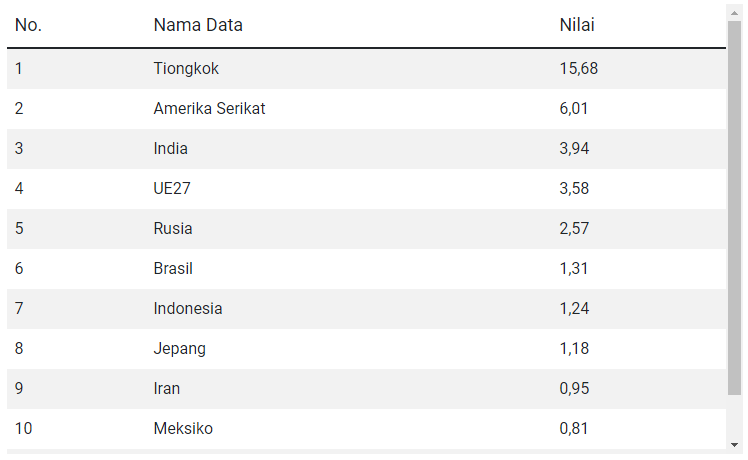Understanding CCUS: Indonesia's Key to Net Zero Emissions by 2060
Dodi, Heru Khoharudin, Salma, Arthi, Wijayanti Purnama, Filza Camellia, Nazal
June 5, 2024
Introduction General Information
Did you know? Indonesia currently ranks seventh in the world as a greenhouse gas (GHG) emitting country in 2022, emitting 1.24 Gt CO2e. This figure has increased from 1.12 Gt CO2e in 2021.
Introduction to CCUS

Well, before we dive into a more in-depth discussion, let’s first get acquainted with CCUS. Carbon Capture, Utilization, and Storage (CCUS) refers to a series of technologies and processes aimed at reducing carbon dioxide (CO2) emissions from large sources such as power plants, refineries, and industrial facilities, or removing existing CO2 from the atmosphere. CCUS involves capturing CO2 emissions, utilizing the captured CO2 to produce valuable substances or products, and storing the CO2 to prevent it from entering the atmosphere.
CCUS is expected to play an important role in meeting global climate targets. Leading organizations including the International Energy Agency (IEA), International Renewable Energy Agency (IRENA), Intergovernmental Panel on Climate Change (IPCC) and Bloomberg New Energy Finance (BNEF) have all produced long-term energy visions that rely on the rapid expansion of CCUS to limit global temperature rise to 1.5°C.
In the Sustainable Development Scenario (SDS), the International Energy Agency (IEA) analyzes several options for reducing carbon emissions, such as hydrogen, bioenergy, renewables, electrification, CCUS, and so on. Among these options, CCUS is the only technology that can capture CO2 that has been released into the atmosphere. While other technologies focus on preventing an increase in carbon emissions, CCUS is the most promising technology that needs to be implemented in every country, especially in Indonesia. As stated in Indonesia’s Intended Nationally Determined Contributions (INDCs) for the Paris Agreement in 2015, Indonesia is committed to reducing carbon emissions by 29% to 41% by 2030, including the introduction of clean and renewable energy and energy conservation.
The Benefits of CCUS for Indonesia
- Reducing carbon emissions and maintaining climate stability in Indonesia.
- In the oil and gas sector, CCUS is utilized as Enhanced Oil/Gas Recovery using CO2 that is reinjected into reservoirs.
- Captured CO2 can be utilized as mineral carbon (Mineral Carbonization) to produce carbonate and bauxite materials.
- In the chemical sector, CO2 can be utilized as Liquid CO2 (LCO2), polymers, and urea.
- In the biological sector, it can be used for algae cultivation (promoting algae growth in the ocean).
The Role of CCUS in Achieving the 2060 Net Zero Emission Target
CCUS can play a strategic role in global decarbonization efforts in several ways. These include: (i) reducing emissions in ‘hard-to-abate’ industries (those that are very difficult to decarbonize); (ii) producing low-carbon electricity and hydrogen, which can be used to decarbonize various activities; and (iii) removing existing CO2 from the atmosphere. The various roles of CCUS can also help make energy supplies more diverse and flexible, which in turn contributes to energy security, a priority for governments around the world.
Challenges and Obstacles
According to the Indonesia CCS Study Working Group, Indonesia is currently still in the Research and Development (R&D) stage for CCUS technology. However, the trend in the use of this technology in Indonesia is focused on increasing production from old oil and gas wells that are spread across various locations in Indonesia. This shows that meeting energy needs from fossil fuels remains a top priority in Indonesia. Meanwhile, using CO2 as EOR (Enhanced Oil Recovery) or EGR (Enhanced Gas Recovery) will not achieve negative emissions because it will result in additional carbon emissions after the oil and gas are extracted back to the surface.
Call to Support CCUS
In closing, we would like to invite the government, industry, academia, and the general public to actively support and participate in CCUS efforts. By combining our strengths, we can achieve significant progress in reducing carbon emissions, supporting sustainable industry, encouraging innovation, and creating a more environmentally friendly future for everyone. Let’s work together to achieve climate goals and ensure a sustainable planet for future generations.
- ASEAN Centre for Energy (ACE). (2017). The 5th ASEAN Energy Outlook (AEO5). Available at: http://www.aseanenergy.org/publications.
- Best, D., Mulyana, R., Jacobs, B., Iskandar, U. P., and Beck, B. (2011). Status of CCS Development in Indonesia. Energy Procedia 4, 6152–6156. https://doi.org/10.1016/j.egypro.2011.02.624.
- Dadan Kusdiana. (2021). Prospect and Challenges of CCUS Application to Reach Net Zero Emission Targets. Directorate General of New, Renewable Energy and Energy Conservation, Ministry of Energy and Mineral Resources: CCUS-USABC Webinar.
- Lucky Yusgiantoro. (2021). Advancing the Adoption of CCUS Innovation to Support Energy Transition in Indonesia. SKK Migas: CCUS-USABC Webinar.
- Tri Hadimasyar. (2021). CCUS Implementation for Carbon Neutral 2060. PLN: CCUS-USABC Webinar.
- databoks.katadata.co.id. 28 September 2023. Greenhouse Gas Emission Volume from 11 World’s Largest Emitting Countries (2022). Accessed on 31 March 2024, from https://databoks.katadata.co.id/datapublish/2023/09/28/indonesia-masuk-daftar-negara-penghasil-emisi-gas-rumah-kaca-terbesar-dunia-2022.
- lse.ac.uk. 13 March 2023. What is Carbon Capture, Usage and Storage (CCUS) and What Role Can it Play in Tackling Climate Change?. Accessed on 31 March 2024, from https://www.lse.ac.uk/granthaminstitute/explainers/what-is-carbon-capture-and-storage-and-what-role-can-it-play-in-tackling-climate-change/.
- mckinsey.com. 26 April 2022. Global Energy Perspective 2022. Accessed on 31 March 2024, from https://www.mckinsey.com/industries/oil-and-gas/our-insights/global-energy-perspective-2022.
- metanesia.id. 29 August 2023. CCUS Technology Development in Indonesia to Reduce Carbon Emissions. Accessed on 31 March 2024, from https://metanesia.id/blog/pengembangan-teknologi-ccus-di-indonesia.
- mirekel.id. 10 May 2022. Understanding CCUS (Carbon Capture, Utilization, and Storage). Accessed on 1 April 2024, from https://mirekel.id/mengenal-ccus-carbon-capture-utilization-and-storage/.
- superradio.id. 3 January 2024. Researcher: Carbon Capture Storage Requires Proper Regulation and Strategy. Accessed on 1 April 2024, from https://www.superradio.id/peneliti-carbon-capture-storage-membutuhkan-regulasi-dan-strategi-yang-tepat/.